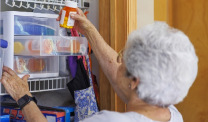Mesothelioma Caregivers: Ask Questions and Be Kind to You
Cancer & CaregivingWritten by Dana Nolan, MS, LMHC | Edited By Amy Edel

As we continue to honor Family Caregiver Awareness month, we’re continuing to highlight conversations about caregiver needs. We’re taking inspiration from the Caregiver Action Network’s Tips for Family Caregivers with a special focus on the experiences and challenges of mesothlelioma caregivers.
We’re offering suggestions on ways that caregivers can be more effective, reduce their stress levels and take better care of themselves. Finding a balance between looking after the needs of your loved one and looking after your own needs as a caregiver is an ongoing challenge.
Stress is a very common experience among family caregivers of loved ones diagnosed with mesothelioma. Taking time for yourself is an important and necessary step in remaining healthy as a caregiver.
How Can I Communicate More Effectively With Doctors?
Of course, if your family member who was diagnosed with mesothelioma can communicate their needs and concerns to their healthcare team, then they should do so. But, as a caregiver, being an extra set of ears during doctor appointments is helpful.
Studies show that patients recall only 10-20% of what is discussed during conversations with their healthcare team. If a family caregiver is present, they can take notes and ask questions, which will increase understanding and recall of more of the important information being discussed during doctor’s visits.
If a family caregiver needs to speak with their loved one’s healthcare team, it’s helpful to have a list ready of symptoms to report and questions to ask. This can help set you up for more effective discussions.
Sometimes healthcare providers use medical terminology or expressions that laypeople may not understand. Ask them to explain anything you don’t understand.
Don’t be embarrassed about it. The healthcare team wants their patients and caregivers to be informed about what is going on but sometimes is not aware that they have slipped into using medical jargon.
What Are Respite Breaks and Why Are They Important?
One of the most common conversations that healthcare providers have with family caregivers is to encourage them to take respite breaks. The definition of respite is a short period of rest or relief from something difficult.
Sometimes family caregivers feel like they need to be available to their loved one all the time and do everything that needs to be done for the person with mesothelioma. They may feel this way because they believe that providing all the care is an expression of their depth of their love and concern. Another reason may be that the caregiver doesn’t trust anyone to carry out the caregiving tasks like they would.
Not taking breaks from caregiving leads to caregiver burnout, which includes developing mental and physical problems. Burned out caregivers are more likely to be irritable, forgetful and experience stress-related medical problems.
I have also heard from mesothelioma patients that they sometimes wish their primary caregiver would take time for themselves. They’d like their caregiver to have time to get out of the house so that they can have some alone time or spend time with other family members or friends.
Caregiver Depression: What to Watch Out For
Mesothelioma patients are not the only ones susceptible to developing depression. Their family caregivers are at risk as well.
Sadness and fear for loved ones with mesothelioma is common amongst caregivers. Many caregivers aren’t engaging in regular self-care or their normal social activities, which can also lead to depression.
- Change in appetite
- Fatigue
- Helplessness
- Hopelessness
- Poor sleep
- Sadness
- Social isolation
- Tearfulness
- Thought of self-harm or death
Depression is treatable with both medication and counseling. But sometimes there is a reluctance to seek help and to report those symptoms.
Be on the lookout for those symptoms and if someone in your life says they’re concerned that you appear depressed, believe them and make an appointment with your primary care physician as soon as possible.






